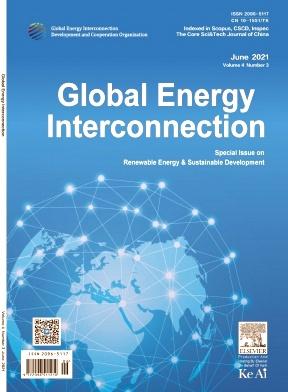基于遗传算法和粒子群算法的光伏电池集成微电网成本管理比较分析
IF 2.6
Q4 ENERGY & FUELS
引用次数: 0
摘要
现代能源系统中微电网的出现预示着一个充满希望的弹性、可持续性和效率的时代。在并网微电网领域,选择最优优化算法是实现有效能源管理,特别是经济调度的关键。本研究比较了粒子群优化(PSO)和遗传算法(GA)在微电网能源管理系统中的性能,并使用MATLAB工具实现。通过文献综述和MATLAB仿真,分析了遗传算法和粒子群算法的性能指标、收敛速度和整体效率,重点研究了经济调度任务。值得注意的是,两种算法生成的微电网运行成本曲线之间存在显著差异,粒子群算法由于其有效的经济调度能力,其成本始终较低。具体地说,利用私人采购服务办法可能导致电费大幅度节省,在本次评价中约为15.30美元。这些发现提供了对并网微电网复杂动态中每种算法的优势和局限性的见解,从而帮助利益相关者和研究人员做出明智的决策。本研究通过matlab实现的优化算法为并网微电网技术的进步提供了可操作的指导,从而有助于可持续能源管理的论述。本文章由计算机程序翻译,如有差异,请以英文原文为准。
Comparative analysis of GA and PSO algorithms for optimal cost management in on-grid microgrid energy systems with PV-battery integration
The advent of microgrids in modern energy systems heralds a promising era of resilience, sustainability, and efficiency. Within the realm of grid-tied microgrids, the selection of an optimal optimization algorithm is critical for effective energy management, particularly in economic dispatching. This study compares the performance of Particle Swarm Optimization (PSO) and Genetic Algorithms (GA) in microgrid energy management systems, implemented using MATLAB tools. Through a comprehensive review of the literature and simulations conducted in MATLAB, the study analyzes performance metrics, convergence speed, and the overall efficacy of GA and PSO, with a focus on economic dispatching tasks. Notably, a significant distinction emerges between the cost curves generated by the two algorithms for microgrid operation, with the PSO algorithm consistently resulting in lower costs due to its effective economic dispatching capabilities. Specifically, the utilization of the PSO approach could potentially lead to substantial savings on the power bill, amounting to approximately $15.30 in this evaluation. The findings provide insights into the strengths and limitations of each algorithm within the complex dynamics of grid-tied microgrids, thereby assisting stakeholders and researchers in arriving at informed decisions. This study contributes to the discourse on sustainable energy management by offering actionable guidance for the advancement of grid-tied microgrid technologies through MATLAB-implemented optimization algorithms.
求助全文
通过发布文献求助,成功后即可免费获取论文全文。
去求助
来源期刊

Global Energy Interconnection
Engineering-Automotive Engineering
CiteScore
5.70
自引率
0.00%
发文量
985
审稿时长
15 weeks
 求助内容:
求助内容: 应助结果提醒方式:
应助结果提醒方式:


